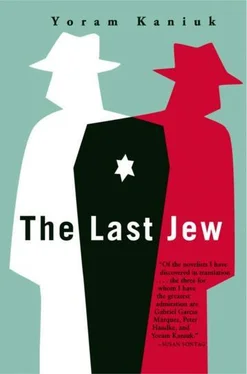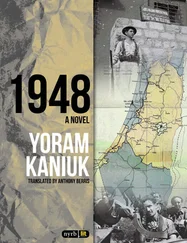The sight of my neighbor made me sad, like somebody who's used to investigating a situation woven of words, two separate entities, two different disasters, the disaster of the Last Jew and God and the disaster of the wars my son falls in and surely it's from that junction, I thought, that the great and awful moments of our life are woven, the junction of celebration and the junction of nightmare, an illness of malediction leaving smoke that came here to ask for steps for feet they didn't have anymore, an echo seeking a foothold, and yet a foothold that knew what its echo was…. Maybe Hasha Masha really is right and there's no need to talk and a man can be silent with his fellow man and know things that many words don't know, maybe it was his accent, when we did speak, an accent composed of an ancient phonetic layer of the natives of the Land of Israel, the way farmers talk, which once, when I immigrated here in the early nineteen twenties, I knew as a worker in their yards, and along with that some foreignness, a refugee language, in short here I hold in my hands an enormous sex organ of some ancient god, spraying water, talking with a scarecrow that sprouted in my neighbor's yard, a scarecrow who came from two disasters, and wonders. We talked of the Giladis and he claimed he didn't know them and didn't know where they had disappeared, I was impolite, maybe because of the heat and I asked myself who he was and where he came from, and he peeped at me like an old acquaintance. With some practiced smile at the edge of his mouth that lacked suppleness and yet was quite harsh, and I sensed that his eyes were mocking me, as if he were saying: Old Henkin, surely we're old friends and surely I knew where I knew him from and he said surely my name is Ebenezer and the name of the woman who lives with me and is married to me is Fanya R. He pronounced the words carefully and I sensed that he had a special need to feel the words as if he weren't used to speaking Hebrew, which sounded, as I said, both rooted and foreign. I sensed that he had a need to say "the woman who lives with me" before "is married to me," an amazing phrase in itself, surely I would have said my wife and not the woman who's married to me as if she's married to him and he isn't married to her?
I thought about the Giladis, about his phrases, about the way he bent over and plucked out tiny crabgrass that I may not have noticed, and then he said: Did Boaz Schneerson come visit you yet? And I thought here it comes, like then, when I learned my son died, simple things once again start to take on a twisted meaning, as if everything was planned and he started taking care of the Giladis' garden so two months later I could come out and hear that name, Boaz Schneerson, from him, and suddenly a distant memory flashed in me, the moment when Boaz maybe really was standing here, still a young man who had just returned from the war, raging and furious, he looked at me, and when I asked him who he was and gave him some cold water he took off. I remember how he looked at me then, and I felt a strange envy of him because he was alive and then when I met him, years later, I didn't remember what I remembered now, and now of all times, when the stranger asks me if Boaz Schneerson came again, or perhaps he said "yet," to visit you, what does he have to do with Boaz? What does he have to do with the person who destroyed my life and stirred Hasha Masha's hostility, where does that stranger get a tie with us? I looked at him in amazement and he managed to smile, a smile Boaz would surely call the smile of a hunter of agricultural machines or something, Boaz's diabolical phrases. A pleasant wind now blew from the sea. The air cooled off in a cooling and graying space, a bittersweet smell of geranium, and the blue sea stretching beyond his back, an overloaded ship sails toward the port of Ashdod, smoke rises from the ship's smokestacks, and the man measures me, waits for an answer, or perhaps not, and I water, that's the safest thing. I don't let the hose slip away, I don't let the stream dwindle and then the man says: So? He doesn't come anymore, the bastard?
No! I said, almost reluctantly. His mouth was gaping open a little, a bird of death I saw, a spasm I saw, invisible blood flows. A blasted cheek, a bandage on an arm, the bold clear colors before sunset, spots of color on the back, was he hit hard? The sight of the scars reminded me again of the sight of Boaz. Back then, when I didn't recognize him, the sight of a captured jackal, and the man talked and straightened up again and I said what I regretted afterward and after you say it there's no way back, I said: This garden belonged to my son, Menahem, he fell in battles in Jerusalem, for him I replanted the garden. But he didn't pay attention to the seriousness I tried to give that moment and he said: Surely you're going to the party this evening, Mr. Henkin, Menahem's been dead a long time…
Before I could digest the words, I said: I'm supposed to go out this evening, but I'm not yet sure I will and once again I wanted to gain time, to understand how he knew what he knew, how he knew my son's name, how he knew I would go out that evening, was he spying on me; his face was shriveled now, as if he had just been taken out of the grave, his hands didn't shake, he held the hose with a certain cunning and only his torso was seen moving a little, as if he were praying and even laughing a laugh pieced together of tatters of pain and seeking a foothold, assembled, and stitched together again, he even demonstrated some insolent shyness. His ear turned red, and his cheek drooped toward a strong and handsome chin and a dimple was hollowed in the cheek, and suddenly out of the blue, in an improvised but wonderfully measured formulation he said: Go, go. It's important to us that you go!
And the hose surely granted me freedom of maneuver and I did aim it at another bush, I started filling the hollow and I thought: Is his pain really more than my pain, can pain be learned? Had he lost more than I? I recalled how Noga visited us suddenly, that was about two or three months ago. She came into the house as if she were hopping on air and not on the ground, as usual, so delicate and yet something solid in her as always. She sat next to Hasha Masha and was silent. Her eyes were fixed on the album of the one who had been her lover.
My wife got up, went to the kitchen, and brought tea. She put on the water in the kitchen in silence, her hands holding the kerosene stove and not seared. My wife touched Noga's forehead with a finger, maybe measuring her son by the love of his youth, by my total incomprehension. Noga sat, more beautiful than ever even though she looked scared that day. Uneasy, she put on her shawl and took it off again with hands that were almost shaking. Every now and then she looked in the mirror and sat next to my wife and then Hasha Masha gave her a black comb and Noga combed her hair and then she gave Hasha Masha some small tweezers she pulled out of her purse. The tweezers were silver plated and capered for a moment in the room whose light came between the slats of the slightly open shutters, and Hasha Masha plucked out two or three hairs from her left eyebrow and then returned the tweezers to Noga and went to the kitchen and put on another kettle of water and came back and let the water steam and when the kettle (I didn't dare do a thing) was empty and about to turn to carbon, Noga got up slowly, almost deliberately, put the hairs carefully into the ashtray, and the hairs that Hasha Masha had plucked were mixed in the water from the vase that was poured into the ashtray and Noga put down the ashtray, touched my wife's head lightly, walked to the kitchen, filled the kettle with water, and the kettle fizzed and groaned, and Hasha Masha, with a certain arrogance, took out her new reading glasses and sat frozen with the reading glasses on her face and then Noga held out a sheet of paper and said: That's what I wrote to the judge about Boaz, and I wondered how Hasha Masha knew that Noga intended to show her a letter she had written to the judge about Boaz, and my wife read the letter and nodded her head and glanced mutely at Noga and Noga didn't lower her eyes but smiled and Hasha Masha said: You know how to condemn scoundrels, Noga, and you also know how to sleep in their beds, and Noga didn't say a thing but took the letter from Hasha Masha and folded it up carefully and put it back in the purse and then with the delicate movement of a tame eagle, she took the glasses off Hasha Masha's eyes folded them up and put them into the case waiting for them on the table and Noga measured the room again as she used to do on hundreds of evenings when I sat with her here when she still lived with us, looked through me and saw a wall and on it, as always, still hung the yellow landscape by the painter Shot, a picture whose frame had been shattered for years now, and after she drank the tea and Hasha Masha put the glasses on Noga's eyes and measured her with a look and took off the glasses and Noga blinked like somebody who isn't used to reading glasses, Noga took out some chewing gum, folded the paper, delicately put the gum into her mouth, chewed it with her mouth closed for a minute or two, went into the bathroom, threw it in the toilet, flushed it, and returned to the table and sat down. Her hand reached forward and in it was the strip of paper that wrapped the chewing gum. Hasha Masha carefully folded the strip of rustling paper and put it in the ashtray, waited until Noga gave her a box of matches and lit a match, burned the paper along with the handful of hairs and then Noga got up, kissed me on my forehead and said, I love you, old Henkin, caressed Hasha Masha, who shut her eyes, giving her face an expression of pleasure and regret, and left the house.
Читать дальше












